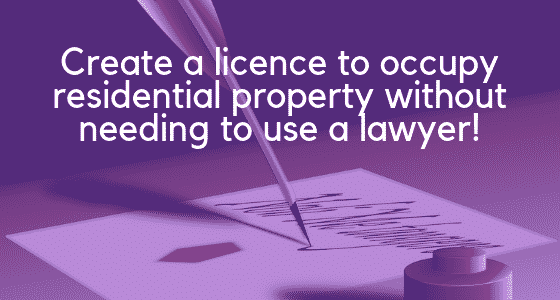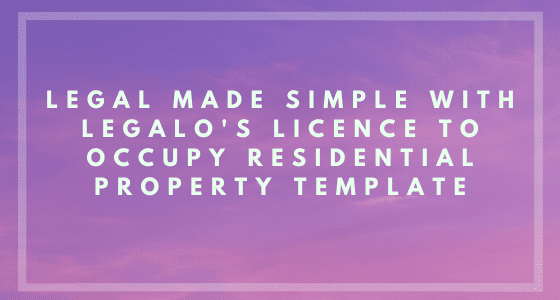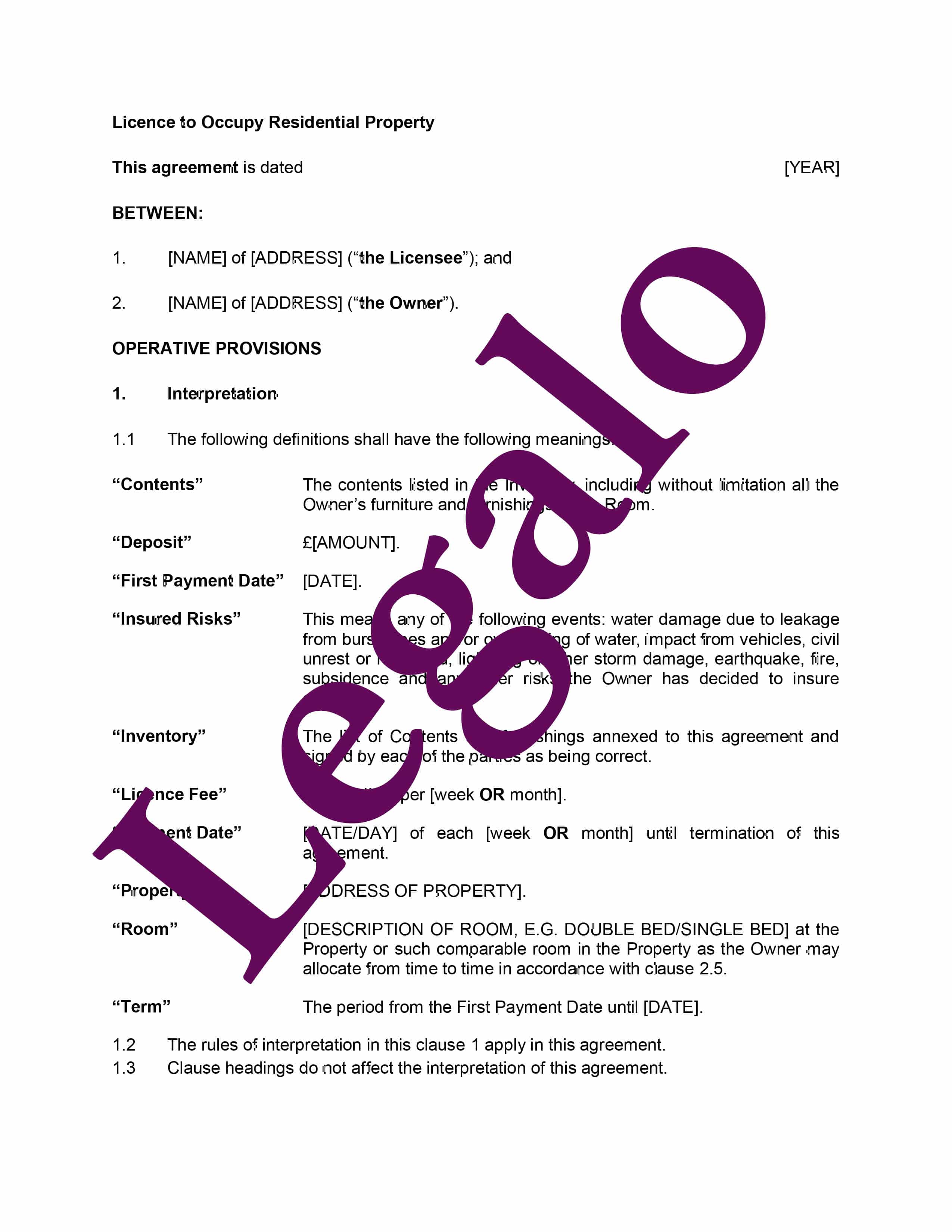Licence To Occupy Residential Property
Our Residential Licence to Occupy template:
- Now over 600 sold!
- Two Templates in One: Room Licence & Whole Property
- Solicitor drafted template
- Editable Word Document (.doc format)
- Clause-by-Clause Guidance Notes

How Does It Work?
-
1. Download
-
2. Edit
-
3. Print
-
4. Sign
Do you need a legally sound, easy-to-use document for short-term residential lets that don’t qualify as full tenancies? Our Licence to Occupy Residential Property Template has been expertly drafted by Stephen, a Legalo co-founder and a qualified English solicitor.
This template is designed for use across the UK. It is perfect for situations where the occupier of the property doesn’t gain exclusive possession. For example, individual room rentals, shared houses, or temporary accommodation.
This residential licence provides a clear, enforceable legal document that protects your rights and helps prevent potentially costly disputes.
Trusted by 600+ UK landlords – One of our most popular legal document templates!
Our Template Pack includes two versions:
- Room Licence – our standard version, for granting use of an individual room with shared facilities.
- Whole Flat / Property (Short-Term Only) – for non-exclusive, very short-duration use (e.g. temporary let, where the owner retains access).
What is a Licence to Occupy Residential Property?
A licence to occupy residential property is a legal agreement that grants someone the right to use a residential property, or part of it, without creating a tenancy.
Unlike an Assured Shorthold Tenancy (AST), a licence does not grant exclusive possession of the property, and the licensor (i.e. the owner) retains rights of access.
Because a licence does not create what we lawyers call ‘an interest in land’, it offers fewer statutory protections to the licensee.
However, this is often seen as advantageous to the landlord, and when used correctly, it provides a flexible, efficient solution for landlords letting premises under short term arrangements.
Note that misusing a licence where a tenancy actually exists could be deemed a “sham licence” by the courts, potentially resulting in eviction delays and legal complications.
Keep in mind, if:
1. you are going to give the tenant exclusive use of just one room in a property that is also your home, then you should use our lodger agreement template instead; or
2. you are letting the whole of the flat or building to one or more tenants, which they will regard as their home (i.e. the landlord doesn’t live there and it is not an HMO), use our assured shorthold tenancy template.
Real-World Scenarios for Using a Licence to Occupy
Understanding when a Residential Licence to Occupy is appropriate will help you avoid legal pitfalls and confidently use the correct agreement. Take a look below at several real-world examples that we come across regularly, where a licence is suitable:
- Short-Term Hosting for Students or Interns: If you let a furnished bedroom in your rental property to a university student for a 10-week summer course, then a licence to occupy can be ideal. You must retain access to the premises (and ideally also the bedroom) and provide shared facilities, such as a bathroom and kitchen.
- Airbnb Short Term Let: You have an annexe at your home and you let it out on lets of between one week and six weeks. In this scenario, a residential licence to occupy is ideal.
- Temporary Corporate Accommodation: A company places an employee in your property for a three-month relocation project. You provide access and exclusive use, but you maintain control over the premises.
- Seasonal Room Rental: You rent out a spare room in your buy-to-let property for a few months during a local festival, without granting exclusive possession. Again, a licence to occupy is perfect in this scenario.
- Housing for Contractors or Carers: You allow a self-employed tradesperson or live-in carer to occupy a room while working on-site or caring for a resident family member. Another example where the license to occupy this residential property is perfect.
If you are having someone else guarantee the occupier’s obligations, then please use our Licence to Occupy Residential Property with Guarantor template.
It is important to note that in each of these examples:
- The occupier does not have exclusive possession
- The stay is short or limited in scope
- The arrangement is not intended to create a long-term tenancy
If the occupier has their own keys, locks the door, and you never enter or provide services, the courts may infer a tenancy exists, regardless of what your agreement says.
Avoid anti-social licensee behaviour
With shared accommodation we recommend putting in place an anti-social behaviour policy. This will ensure that you have clear recourse in the event that the licensee behaves in an unsociable manner.
When Should You Use This Residential Licence Template?
As should hopefully be clear from the above real world examples, this document is suitable for specific non-exclusive and short-term arrangements in the UK, such as:
- Short-Term Lets: Temporary occupation of a part of your property.
- Room Rentals in Shared Houses or HMOs: Where occupiers have rooms under licence, and not not have exclusive use of the property.
- Student or Temporary Accommodation: Where the occupier does not treat the property as their main home, and occupies it with other individuals and shares common parts like a kitchen
- Employment-Linked Housing: e.g. service occupancy for a live-in caretaker (seek specific legal advice here)
Key Differences: Licence to Occupy vs Tenancy Agreement (AST)
We regularly get asked whether a person should use a licence to occupy or a tenancy agreement when they let residential property. So much so that we have written a detailed guide on licence to occupy v tenancy agreement.
For those looking for an abbreviated answer, see the summary below. Understanding the distinction is vital:
Licence to Occupy
It has the legal status of a personal permission. The occupant is legally classified as a ‘licensee’. The occupant has very limited statutory rights. Eviction can be carried out relatively simply by issuing a ‘Notice to Quit’.
There is no legal requirement to place the deposit with a recognised secured deposit scheme. The term of the licence is generally flexible. Usually short term, or rolling with the ability to terminate at any time with limited notice (e.g. 28 days).
Tenancy Agreement
It has the legal status of an ‘interest in land’. The occupant is legally classified as a ‘tenant’. The tenant benefits from extensive statutory rights and protection. Eviction requires strict adherence to formal legal processes (either a s8 or s21 notice is required – each with strict criteria for eligibility).
Any deposit must be placed with a recognised tenancy deposit scheme. The term is generally for a fixed initial term and then either renewable for the same term or rolling until a termination notice is served.
Choosing the Right Agreement: Licence, Lodger, or AST?
This is something you need to get right. If you are unsure after reading our guidance notes on this page, please get in touch with us. David (a co-founder of Legalo) will guide you through selecting the correct template.
Selecting the correct agreement prevents future disputes, and we appreciate that the position can be confusing. We’ve done our best to clarify when exactly to use a licence to occupy for residential letting. However, if you do have any remaining uncertainty or questions, please do call us.
When calling, you’ll get through to David, (a co-founder at Legalo) He’ll happily guide you through any questions that you may have.
If you don’t have time to call and do have any remaining uncertainty, here’s a quick guide:
Use This Template If…
- You’re renting a room or whole property short-term without giving exclusive possession.
- You retain access to the property. For example, for cleaning or servicing it.
- It’s an HMO-style or temporary setup.
Use a Different Agreement If…
- You’re renting a room in your own home → Use a Lodger Agreement.
- You’re letting a whole property with exclusive possession → Use an AST.
- It’s for commercial use → Use a Commercial Licence.
Still Unsure? As we’ve said above, you can call David and he’ll answer any questions that you have. Alternatively, the housing charity Shelter offers a helpful online tool to check tenancy types (intended for tenants, but useful for landlords too): Shelter Tenancy Checker (Note: External link). For definitive advice, consult a legal professional.
Meet the Author: Legal Expertise You Can Trust
We’ve mentioned Stephen several times above. Stephen created this template. He’s a co-founding solicitor of Legalo (along with David) and an experienced English solicitor. Stephen has ensured that each document is carefully designed to comply with UK landlord laws and reflect real-world letting scenarios. You can view Stephen’s bio here and view his SRA profile.
Step-by-Step – How to Use the Licence to Occupy Template
Completing and Customising Your Template
Our solicitor-drafted Licence to Occupy template for residential property is designed for simplicity and clarity. Here’s how to complete it correctly:
1. Enter the Parties’ Details
- The Licensor is the property owner or authorised landlord.
- The Licensee is the individual occupying the property.
2. Identify the Property
- Specify the full address of the property.
- Clearly describe the room or area being licensed (e.g., “Bedroom 2 on the first floor”)
3. Define the Licence Fee
- State the agreed payment amount and payment frequency (e.g., “£600 per calendar month, payable in advance on the 1st of each month”).
4. Set the Term
- Input the licence’s start and end dates (e.g., “1st June 2025 to 31st August 2025”)
- For open-ended arrangements, include termination conditions (e.g., rolling weekly or monthly with 28 days’ notice to terminate).
5. Clarify Shared Facilities
- List any shared areas (e.g., “kitchen, living room, bathroom”) to demonstrate non-exclusive occupation.
6. Include an Anti-Social Policy as an Attachment (if applicable)
- Consider attaching our Anti-Social Behaviour Policy in tandem with the licence agreement for clarity.
7. Sign and Date
- Both parties must sign and date the agreement.
- A witness is not required, as this is a simple contract, not a deed. You can use electronic signing by both parties if you want.
💡 Tip: Keep a signed copy for your records and provide one to the licensee.
What Happens If You Use a Licence When a Tenancy Exists?
Using a Licence to Occupy when the legal arrangement is actually a tenancy can lead to serious complications. Courts look at the substance of the arrangement, not the label on the document.
🚩 Potential Risks Include:
- Eviction Problems: With a tenancy agreement, you must follow tenancy eviction procedures (e.g., Section 21 or Section 8 notice processes for terminating the tenancy early) if the occupier is deemed a tenant, even if your document says “Licence.”
- Deposit Penalties: If the occupier paid a deposit and it wasn’t protected under a tenancy deposit scheme (which is a legal requirement for assured shorthold tenancy relationships), you could face penalties of up to 3x the deposit amount.
To avoid these risks, always assess the actual nature of the arrangement. If in doubt, consult a solicitor or consider using an AST.
Landlord Checklist – Before Using a Licence to Occupy
Pre-Use Checklist for Landlords
Use this checklist to confirm a Licence to Occupy is suitable for your situation:
| ✅ Check | Description |
| 🔲 The occupier does not have exclusive possession of the room or property | You retain access, provide services, or share facilities |
| 🔲 The occupier’s stay is short-term or clearly limited in duration | Typically under 6–12 months |
| 🔲 The property is not the occupier’s only or primary residence | e.g., student accommodation, temporary contract work |
| 🔲 You are not granting a fixed-term lease with full rights to exclude you | |
| 🔲 You provide shared services or facilities | Such as kitchens, bathrooms, cleaning, etc. |
| 🔲 You will serve a Notice to Quit for termination | Rather than Section 21 or 8 notices |
If you answer “No” to any of the above, you may need a different legal agreement, such as a Lodger Agreement or an AST.
FAQs on Licences for Residential
Below we have addressed some of the most popular questions about licences from the Internet.
What is a residential licence to occupy?
This is a right to occupy part of a building. It is generally on a non-exclusive basis, and generally for relatively short period of time. You should only use one in a limited set of circumstances, and one in which it is a genuine situation. Most cases are tenancies. So you should use an Assured Shorthold Tenancy agreement then, instead of a licence to occupy residential property.
Is a licence to occupy the same as a tenancy agreement?
No. Under a tenancy, the tenant has better rights, such as greater protection against eviction and deposit protection. A licence to occupy residential property is a less strong right. It should, however, only be used in appropriate situations.
Why use a licence instead of a tenancy?
You should use a licence only in appropriate circumstances. Many landlords overuse them, because it is slightly easier to evict a licensee than a tenant and the occupier has fewer rights in a genuine licence situation. However, you should only use them in genuine circumstances, or you could be prosecuted, or use the wrong eviction notice and process and get your case thrown out by the court to have to start over, possibly with having to pay the tenant’s court costs and compensation.
If you are renting out a whole house to a family and they clearly intend to stay there a long time (or could potentially do so), then you should be granting them a Tenancy Agreement, not a licence to occupy. A licence to occupy is more suited to short-term lettings, such as holiday lets, temporary local authority accommodation for homeless applicants, student flats, rooms in houses in multiple occupancy (HMOs), lodger situations, hotels and hostels, service accommodation for employees required to live there for their job (e.g. caretakers), and the rental of boats (e.g. houseboats).
Can a licence become a tenancy?
If you misuse the licence to occupy by using it in circumstances that are inappropriate, then the court might well rule that it is a tenancy. Just because you labelled the agreement a “licence to occupy”, does not make that title legally binding. If occupancy under a licence runs on a lot longer than expected, it can also turn into a tenancy.
How does a licence to occupy work?
The landlord grants the licence in writing, the occupant signs it, and both keep copies. The licence gives the occupant a right to occupy certain parts of a building in accordance with the terms of the licence and in return for the payment of a licence fee. The licence might impose certain restrictions, such as on the amount of people who can live there, or on what the occupant can do there.
Does a licence give you an estate or an interest in land?
No. It gives you a temporary right to be there but not on an exclusive basis, so it is not classed as an interest in land.
How long can a licence to occupy last?
A licence to occupy, of its nature, should be a short-term, informal matter. They are usually for up to 6 or 12 months. If you are looking at a longer situation developing, then consider using a tenancy agreement instead.
Can a tenant grant a licence to occupy residential property?
Generally a tenancy agreement will ban the tenant subletting the whole or part, or letting part under a licence to occupy. If it does not, then in theory a tenant can grant a licence to occupy. If a tenant grants a licence to occupy in breach of his tenancy, then the landlord could evict him.
How do you terminate a licence to occupy?
You give notice in accordance with the terms of the licence. This is usually for not less than 28 days’ notice (in accordance with section 5 of the Protection from Eviction Act 1977), unless there has been a breach of the licence by the occupier. You do not need to use a Section 21 notice (they are only for tenancies) if it is a genuine licence situation.
How do I evict someone with a licence to occupy residential property?
After serving the correct Notice to Quit, if the licensee doesn’t leave, you will need a court order for eviction (except for excluded occupiers like lodgers living with you). The court process is relatively fast, and details can be found here on the Government website.
Can a licence to occupy be verbal?
Technically, yes, but this is highly inadvisable. Any verbal agreements are hard to enforce if a dispute arises. A written agreement is good evidence as to what the parties agreed and when. It is much “better to be safe than sorry” when it comes to legal agreements being in writing.
Does a licence to occupy residential property need to be in writing?
It is important, in order to avoid legal disputes, that any legal document is in writing. For the licence to occupy, this includes setting out in writing the licence fee and the notice period to terminate it.
Is a licence to occupy legally binding?
A written licence to occupy is legally binding, but as it is easier to terminate than a tenancy, it is not as strong a right as a tenancy. However, a “sham” licence is at risk of:
- being treated by the court as a tenancy;
- you can get prosecuted by Trading Standards for this; and
- you might have to pay compensation to the tenant too.
So do not misuse them, for the reasons notes above.
Does a licence to occupy need to be signed as a deed?
No. It is a simple contract. You can sign it without needing witnesses, i.e. not as a deed.
Who pays for a licence to occupy residential property?
The occupier pays the licence fee under a licence to occupy. There is no Stamp Duty to pay the grant of a licence to occupy (that applies to leases of commercial property of 7 years or longer).
Ready to secure your letting arrangement? Download Your Template
Get instant access to our solicitor-approved Licence to Occupy Residential Property template – ideal for UK landlords managing short-term lets or room-only arrangements.
👉 Download Licence to Occupy Template
💡 Want extra protection? Add our Anti-Social Behaviour Policy
Disclaimer: The information provided on this page is for general guidance only. While this template is drafted by Stephen, a solicitor, and co-founder of Legalo, it’s recommended to seek specific legal advice if you are unsure about your circumstances or the correct agreement to use.





